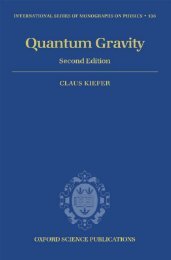Three Roads To Quantum Gravity
Three Roads To Quantum Gravity
Three Roads To Quantum Gravity
You also want an ePaper? Increase the reach of your titles
YUMPU automatically turns print PDFs into web optimized ePapers that Google loves.
28 THREE ROADS TO QUANTUM GRAVITY<br />
deduce true statements from other true statements. Unfortunately,<br />
this kind of logic is completely inapplicable when it<br />
comes to making deductions about the whole universe.<br />
Suppose we count all the cats in the region of the universe<br />
that we can see, and the number comes to one trillion. This is<br />
a statement whose truth we can establish. But what of a<br />
statement such as, `Fourteen billion years after the big bang,<br />
there are a hundred trillion cats in the whole universe'? This<br />
may be true or false, but we observers on Earth have<br />
absolutely no way of determining which. There may be no<br />
cats farther than 14 billion light years from us, there may be<br />
99 trillion or there may be an in®nite number. Although these<br />
are all assertions that we can state, we cannot decide whether<br />
they are true or false. Nor can any other observer establish the<br />
truth of any claim as to the number of cats in the universe.<br />
Since it takes only about four billion years for cats to evolve<br />
on a planet, no observer could know whether cats have<br />
evolved in some region of space so far away from her that<br />
light re¯ected from their mysterious eyes could not have yet<br />
reached her.<br />
However, classical logic demands that every statement be<br />
either true or false. Classical logic is therefore not a description<br />
of how we reason. Classical logic could be applied only<br />
by some being outside the universe, a being who could see the<br />
whole cosmos and count all its cats. But, if we insist on our<br />
principle that there is nothing outside the universe, there is<br />
no such being. <strong>To</strong> do cosmology, then, we need a different<br />
form of logic ± one that does not assume that every statement<br />
can be judged true or false. In this kind of logic, the statements<br />
an observer can make about the universe are divided into at<br />
least three groups: those that we can judge to be true, those<br />
that we can judge to be false and those whose truth we cannot<br />
decide upon at the present time.<br />
According to the classical view of logic, the question of<br />
whether a statement can be judged to be true or false is<br />
something absolute ± it depends only on the statement and<br />
not on the observer doing the judging. But it is easy to see that<br />
this is not true in our universe, and the reason is closely<br />
related to what we have just said. Not only can an individual


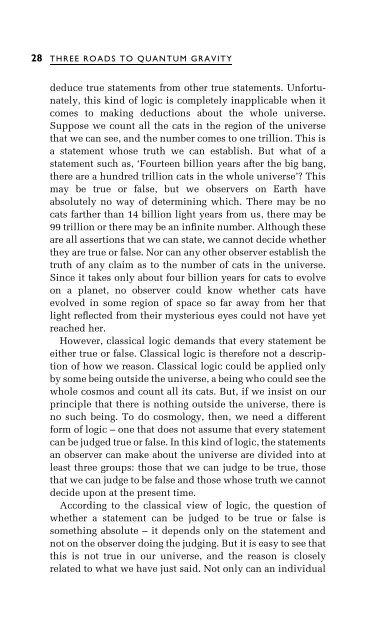
![arXiv:1001.0993v1 [hep-ph] 6 Jan 2010](https://img.yumpu.com/51282177/1/190x245/arxiv10010993v1-hep-ph-6-jan-2010.jpg?quality=85)
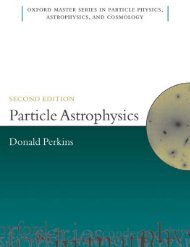
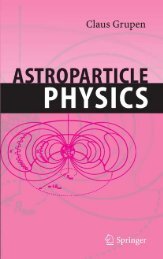
![arXiv:1008.3907v2 [astro-ph.CO] 1 Nov 2011](https://img.yumpu.com/48909562/1/190x245/arxiv10083907v2-astro-phco-1-nov-2011.jpg?quality=85)
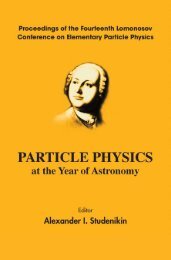
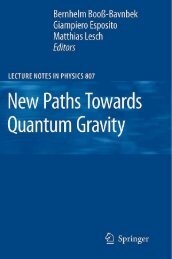
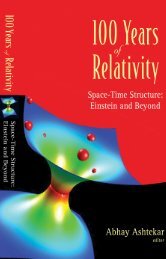
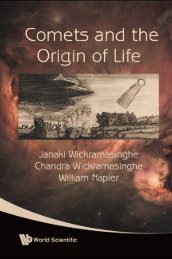
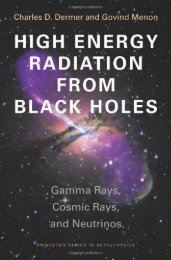
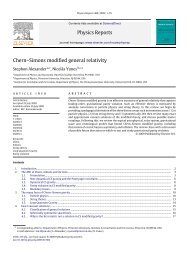
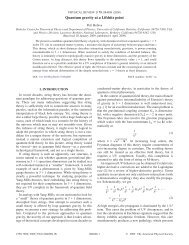
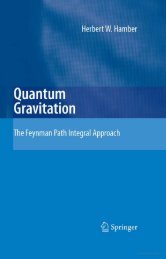
![arXiv:1002.4928v1 [gr-qc] 26 Feb 2010](https://img.yumpu.com/41209516/1/190x245/arxiv10024928v1-gr-qc-26-feb-2010.jpg?quality=85)
![arXiv:1206.2653v1 [astro-ph.CO] 12 Jun 2012](https://img.yumpu.com/39510078/1/190x245/arxiv12062653v1-astro-phco-12-jun-2012.jpg?quality=85)
